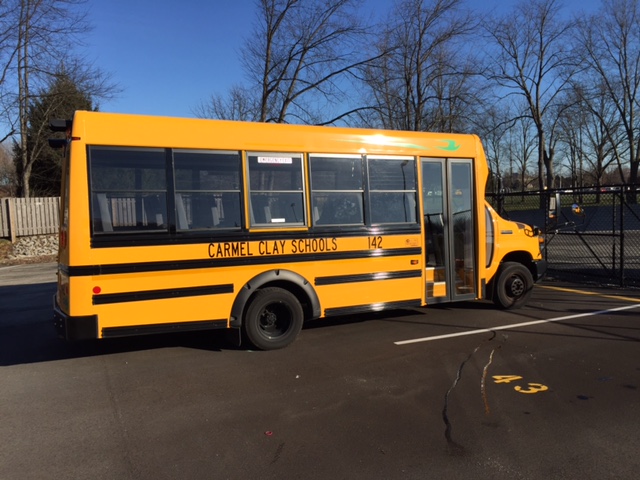There are several reasons why Ron Farrand Jr., director of Carmel Clay Schools facilities and transportation, is a proponent of propane buses.
The school district has 24 propane Type A or mid-size Type C buses, which are about two-thirds of the district’s smaller bus fleet. The buses serve 12 to 30 passengers.
“These are our smaller buses that we use to transport our special needs students,” Farrand said. “We are interested in alternative fuels and the environmental impact of that, and we also felt like it was a positive for our special needs students. Those buses park nose to tail because they have handicapped lifts, so we are letting students off on the curb as opposed to parking side by side like our larger buses.
“We wanted to further reduce the exposure to fumes and exhaust emissions for those students, many who have underlying health issues.”
Farrand said Micro Type A propane buses save the district money because of the low cost of maintenance and fuel.
“The low emissions help us do our part to clean up air quality,” Farrand said.
All of the propane buses have the ROUSH engine, Farrand said.
“Those are purpose-built engines,” Farrand said. “We don’t have propane engines on our large buses. There aren’t any purpose-built engines, they are conversions whereas the ROUSH engine was developed specifically for propane.”
Farrand said when manufacturers make propane engines for larger buses, CCS will be interested. CCS purchased one large electric large in 2020.
CCS purchased its first propane bus in 2014.
“We’ve been successful a couple times to get grants to help reduce the cost of the propane buses,” Farrand said. “We’re going to get a couple more at least this year in our normal bus purchase cycle. Some of the older ones that are up for this year that are probably diesel will be replaced with propane buses.”
CCS has two transportation facilities, one on East Main Street and another on the far westside campus.
“We did that a few years ago to reduce travel time between the far west schools back to the east side,” Farrand said. “We have fueling sites at both sides, including propane.”
Ryan Zic, vice president of sales for Michigan-based ROUSH CleanTech, said his company supplies fuel systems to Micro Bird, based in Quebec, Canada.
“We see propane being a really good complement to electric vehicles because there are limitations on the electric side,” Zic said. “They’re really good in some applications but they have some mileage limitations since they can only go so far between charges. They have some challenges in extreme cold. Propane is a good complement because it’s at home when it gets colder out. These are mostly lower tailpipe emissions than with gas or diesel.
“The vehicles Carmel Clay Schools has gotten from us are 75 percent cleaner across the eight standards than what the federal requirements are.”
Zic said propane autogas reduces maintenance costs and wear and tear on the engine and components. On average, the fuel costs about 40 percent less than gasoline and 50 percent less than diesel.



